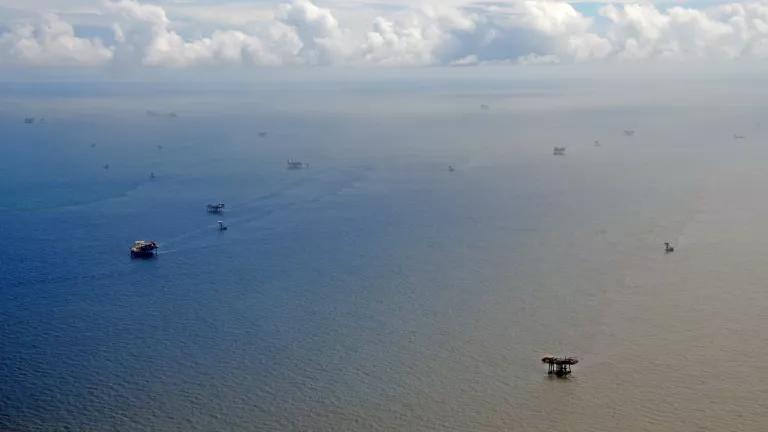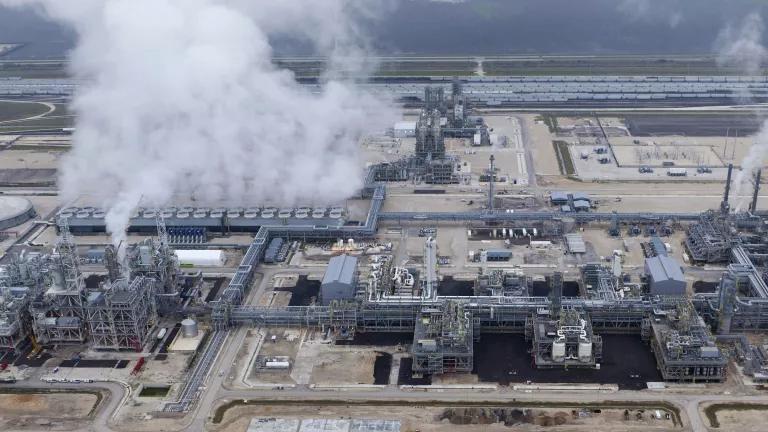New York State's Fracking Ban Is Official
It's official! New York State has taken the historic step of banning high-volume fracking throughout the state.
I know, you may have thought that had happened back in December. In fact, while Governor Cuomo - through his Commissioners of Environmental Conservation and Health - announced then that the state's determination was to prohibit fracking, it was the issuance of a so-called Findings Statement that culminated the nearly 7-year environmental review process that formalized that decision.
The Findings Statement is the document that demonstrates that the Department of Environmental Conservation has properly considered all of the factors mandated under the state's environmental review law, and sets forth the basis for its determination on a proposed project - in this case, a new high-volume fracking program. It is both legally binding on the state's regulators and, as discussed further below, not easily dismantled by future decision makers.
In a nutshell, the Findings Statement says that, after considering (1) the potential environmental and health impacts, as well as (2) potential measures that could be imposed to mitigate those impacts, and factoring in (3) substantial scientific uncertainties and (4) limited economic and social benefits, (5) a ban is the only alternative that ensures that potential adverse effects are maximally avoided or minimized.
Apologies for its length, but this quote from the Statement's introduction sums it all up:
Even with the implementation of an extensive suite of mitigation measures considered by the Department and described in these findings, the significant adverse public health and environmental impacts from allowing high-volume hydraulic fracturing to proceed under any scenario cannot be adequately avoided or minimized to the maximum extent practicable... In addition, ... significant uncertainty remains regarding the level of risk to public health and the environment that would result from permitting high-volume hydraulic fracturing in New York, and regarding the degree of effectiveness of proposed mitigation measures. Consequently, and due to the limited economic and social benefits that would be derived from high-volume hydraulic fracturing, the No-Action alternative - i.e., a ban on fracking - is the only reasonable alternative consistent with social, economic and other essential considerations.
In addition to the wide array of impacts catalogued - to water and air resources, wildlife and ecosystems, communities, public health etc. - here are a few of the key specific findings that stand out:
- Fracking contributes to climate change: "[R]egardless of the magnitude of methane emissions from natural gas infrastructure, the consumption of fossil fuel, including natural gas, to produce energy contributes to climate change. Additionally, the increased availability of low-cost natural gas has the potential to undermine the deployment of various types of renewable energy and energy efficiencies, thereby suppressing investment in and use of these clean energy technologies."
- Fracking might cause earthquakes: "While induced seismic events...are more typically associated with waste disposal or other long-term injections, there have been several instances where seismic events have been linked to hydraulic fracturing operations in the United Kingdom and Canada, and in the United States including Ohio, Oklahoma and Texas. Recent earthquakes observed in Poland, Ohio, which were linked to hydraulic fracturing, occurred in an area with the same seismic hazard class rating as those portions of New York with the lowest seismic hazards class rating..."
- Potential economic benefits would be much less than previously estimated: "In light of changing development patterns in the natural gas industry, the Department considered revised projections in which the 20-year peak construction period...would be reduced to 10 years to more realistically reflect the development that could be expected, which would then be followed by a 10-year gradual decline in production [which] would reduce employment projections, projected employee earning and property tax receipts."
- AND -
"The potential economic benefits...would also likely be further reduced by the Court of Appeals recent decision...which found [state law] does not preempt communities with adopted zoning laws from prohibiting high-volume hydraulic fracturing ... Additionally, numerous mitigation measures ...would have limited where high-volume hydraulic fracturing could occur in new York State. Based on these limiting factors, the Department concluded that the number of wells that would be drilled would have been substantially reduced."
- The extent of public health risks remains unknown: "Until completion of ongoing studies by the National Institutes of Health, the National Science Foundation, the Environmental Protection Agency, and others regarding public health impacts from high-volume hydraulic fracturing, the Department will adhere to the [Department of Health] recommendation in its public health review that 'until the science provides sufficient information to determine the level of risk to public health from [fracking] to all New Yorkers and whether the risks can be adequately managed ... [fracking] should not proceed in New York State.'"
- Only a ban can adequately protect New Yorkers and their environment: "In the end, there are no feasible or prudent alternatives that would adequately avoid or minimize adverse environmental impacts and address the scientific uncertainties and risks to public health from this activity. The Department's chosen alternative to prohibit high-volume hydraulic fracturing is the best alternative based on the balance between protection of the environment and public health and economic and social considerations."
Much has been made by the industry of EPA's recently issued draft study on the risks fracking presents to drinking water. The Findings Statement takes that on directly and rightly emphasizes the key conclusions of the study, which are that "[w]hile the report did not find 'widespread [or] systemic impacts on drinking water resources 'it did confirm a number of specific instances where some of these potential mechanisms led to impacts on water resources ... [EPA] also acknowledged that factors limited the certainty of the draft report, including insufficient pre- and post-fracturing drinking water data and a lack of long-term systemic studies." As my colleague Briana Mordick likes to say "absence of evidence is not evidence of absence." The right interpretation of EPA's study - and the one obviously accepted by New York - is that we simply don't have enough information yet to conclude how widespread impacts to drinking water from fracking are, but we know they exist.
The burning question for many has been, how "permanent" is this ban? The short answer is that nothing in this world is "permanent." Even an amendment to the New York State Constitution "forever banning fracking" could be undone with enough legislative and popular votes. But this is a powerfully legally defensible determination and one that it would take substantial efforts to undo. First, the document is legally binding on the Department of Environmental Conservation. Any decision by this or a subsequent administration to reverse the ban would almost certainly require, at minimum, a lengthy and involved environmental review process like the one we've just been through. Moreover, in light of the comprehensiveness and scope of the environmental and health reviews, it would need to show that enough had changed in the scientific literature to justify a different outcome. And it would necessitate surviving additional rounds of public input from a populace that has demonstrated its overwhelming support for the decision not to frack.
The Legislature could, in theory, enact a law superseding this regulatory decision. But no one genuinely believes a majority of the current and reasonably foreseeable members of that body would even seriously entertain doing so.
So, is it "permanent"? No, but it's about as legally solid as any such determination could be. Anyone who reads the Findings Statement must conclude that there can be no longer be any serious question - on either end of the political spectrum - that Governor Cuomo and his administration have finally and fully banned fracking in New York State.
Coupled with the recently released State Energy Plan, which sets forth a series of sweeping and ambitious clean energy goals for New York, the Cuomo Administration has firmly established itself as a national leader on energy matters: one that is demonstrating through its actions that the future lies in saying no to continued reliance on dirty fossil fuels and yes to renewables and efficiency.



